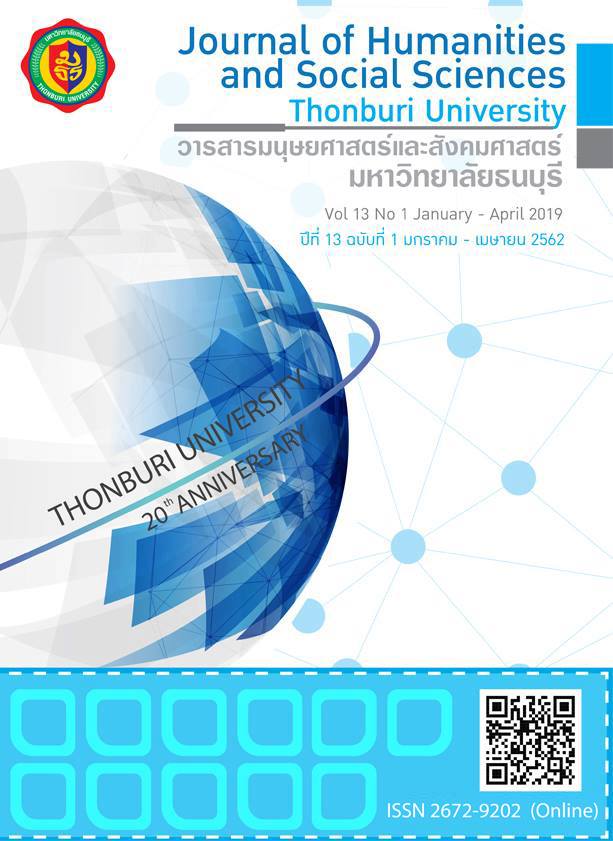THE EFFECTS OF POSITIVE THINKING ENHANCING ACTIVITIES IN GRADUATE DIPLOMA PROGRAM IN TEACHING PROFESSION STUDENTS
Keywords:
Positive Thinking Enhancing Activities, Graduate Diploma Program in Teaching Profession StudentsAbstract
Abstract
The research was a true-experimental design and pretest-posttest control group design. The purposes of this study were to compare the positive thinking of Graduate Diploma Program in Teaching Profession Students who took or did not take the positive thinking activities. The sample consisted of 75 graduate diploma program in teaching profession students at Thonburi University and were divided on random assignment into an experimental group of 40 people and a control group of 35 people. The experimental group used the Positive Thinking Enhancing Activities that was inner communication in 4 stages. The control group in this study was active control group, which used another activity that did not involve positive thinking. The research instruments included a Positive Thinking Enhancing Activities and a Positive Thinking Questionnaire and descriptive statistics on Two-way ANOVA was used to analyze the hypothesis of this study. The results of the research can be summarized as follows: 1) After the Positive Thinking Enhancing Activities, the experimental group showed significantly total positive thinking score higher than the control group at 0.01. 2) The result of the research found that after the positive thinking enhancing activities, the experimental group showed significantly posttest positive thinking score higher than pretest positive thinking score at 0.01.
Keyword: Positive Thinking Enhancing Activities, Graduate Diploma Program in Teaching Profession Students
References
อรพินทร์ ชูชม. (2544). จากทฤษฎีสู่แนวปฏิบัติในการมองโลกในแง่ดี. ใน รวมบทความทางวิชาการ เล่ม 2 จากแนวคิด…สู่การปฏิบัติ. อัจฉรา สุขารมณ์ วิลาสลักษณ์ ชัววัลลี และ อรพินทร์ ชูชม. 165-181. กรุงเทพฯ: DESKTOP.
เรวดี ทรงเที่ยง. (2548, กรกฎาคม–ธันวาคม). การพัฒนาโปรแกรมส่งเสริมแรงจูงใจภายในเพื่อสร้างสัมพันธภาพในการทำงานของหัวหน้าช่างในศูนย์บริการรถยนต์ วารสารมหาวิทยาลัยศรีนครินทรวิโรฒ. 1(2): 47-58.
_______. (2550, มกราคม-มิถุนายน). การคิดเชิงบวก (Positive Thinking). วารสารดวงแก้ว. 12(1): 69–76.
Buckley, R., & Jim, Caple. (1995). The Theory of Practical of Training. 3rded. London: Kogen Page.
Clear, J. (2018). How Positive Thinking Builds Your Skill, Boosts Your Health, and Improves Your Work. Retrieved February 9, 2018. from http://jamesclear.com/positive-thinking.htm.
Deci, E.L., Koestner, R., & Ryan, R.M. (1999, November). A Meta-Analysis Review of Eperiments Examining the Effects of Extrinsic Rewards on Intrinsic Motivation. Sychological Bulletin. 125(6): 627-668.
Goleman, D. (1998). Working with emotional intelligence. New York: Bantam Books.
Hajee, K. (2013). How Positive Thinking Re-Wires Your Brain. Retrieved from http://affirmationsforpositive thinking.com/blog/how-positive-thinking-rewires-yourbrain/
Seligman, M. (1998). Learned Optimism. New York: Simon & Schuster.
Translated Thai References
Sitsira-at, S. (2015). Personality and Adjustment in work. Bangkok: Department of Psychology, Faculty of Humanities, Srinakharinwirot University. (in Thai)
Songtiang, R. (2005). Development of a Program Promoting Intrinsic Motivation in Work Relationship in Automobile Service Centers Team Leaders. Srinakharinwirot University Journal. 1(2): 47-58. (in Thai)
_______. (2007). Positive Thinking. Doung Kaw Journal. 12(1): 69-76. (in Thai)
Sukhlarom, A., Chuawanlee, V., & Chuchom, O. (2001). Include academic articles from the concept to the practice. O. Bangkok: DESkTOP. (in Thai)







